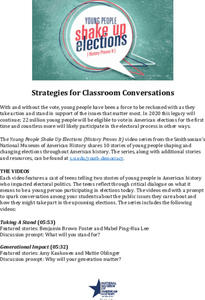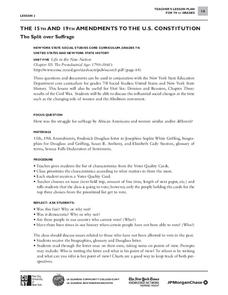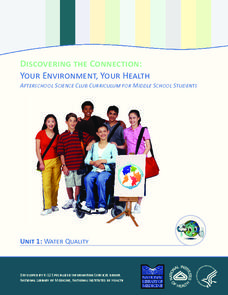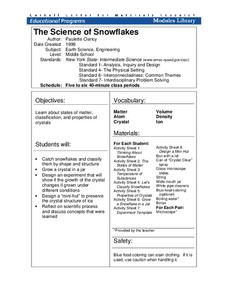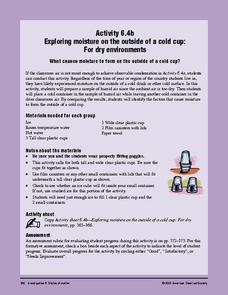American Chemical Society
Heat, Temperature, and Conduction
How does heat move from one item to another, even when the items are in different states of matter? Pupils experiment with adding washers to hot water and adding hot washers to room temperature water to observe the heat transfer.
It's About Time
Polymers
All plastics contain polymers, but not all polymers are plastic. Young chemists make their own polymer and compare the properties to those of other states of matter. After a reading passage, pupils answer analysis questions about natural...
PBS
Out of the Shadows | Black America Since MLK: And Still I Rise
Two powerful video clips launch a study of race relations in the United States after the Selma, Alabama riots, the passage of the Votings Rights Act, and the riots in Watts, California.
Heritage Foundation
The Office of the Executive
An executive is not just a leader of a company; you can also use the term to describe the president of the United States. The ninth part of a 20-part unit teaches high schoolers about the importance of the executive branch and the...
Curated OER
The Heart of the Matter
Upper elementary pupils learn about the blood transportation system and anatomy of the human heart. They fill in an outline of the human heart (not included) focusing on the flow of blood to and from the heart. Using stethoscopes, they...
University of Chicago
Don't Be Too Flaky
Snow, ice, and water are all composed of H2O. Does that mean they all have the same volume? Discover the ways that the densities of these substances determine their volumes, and how they change based on their current states of matter....
Friends of Fort McHenry
Baltimore – Caught in the Middle
Choosing sides is no easy matter, and this was certainly true for the citizens of Baltimore in the beginning stages of the Civil War. Using video, group analysis of several primary sources, and discussion, this detailed and thorough...
Science 4 Inquiry
All the Small Things
Scholars use sorting cards to try to define a pure substance versus a mixture. Risk becomes reward as they observe the differences and create a flowchart sorting matter into mixtures and pure substances (elements and compounds).
Smithsonian Institution
Young People Shake Up Elections (History Proves It) Educator Guide
Vote, it's your civic duty! The resource provides several videos about voting in the United States. Scholars watch a series of topics ranging from youth participation to civic action. The educator's guide provides teachers with...
City University of New York
The 15th and 19th Amendments to the U.S. Constitution
Who gets to vote? Learn more about struggles for suffrage throughout United States history with a instructional activity based on primary source documents. Middle schoolers debate the importance of women's suffrage and African American...
PBS
Evolution of the Presidency: Theodore Roosevelt to Franklin D. Roosevelt
How much power should a president be allowed to exert? Theodore Roosevelt and Franklin D. Roosevelt exercised their power according to their interpretations of the United States Constitution, and these interpretations affected the...
American Chemical Society
Changing State: Condensation
When you have a cold drink and you notice the water forming on the outside, it is literally pulling the water from the surrounding air to form the condensation. After watching a demonstration of condensation forming on a glass,...
National Library of Medicine
Your Environment, Your Health: Water Quality
How important is water quality where you live? The first module in a six-unit series includes four lessons on water quality. By applying the concept directly to the lives of pupils, they engage in meaningful learning. They read about...
Cornell University
The Science of Snowflakes
Who can grow the best crystals? Challenge class members to develop strategies for enhancing growth in the crystals. Through a lab investigation, learners study the properties of crystals and test the effectiveness of different growth...
Carolina K-12
The Twenty-Sixth Amendment and the Power of Youth
Empower teenagers to take political matters into their own hands! After completing an engaging warm-up activity, class members discuss both sides of the youth voting issue, learn about the connection between military history and the...
Beyond Benign
Synthesis and Analysis of Biodiesel
Fossil fuels are non-renewable resources and have become crucial to the livelihood of countless individuals. Young chemists investigate an alternative method of generating energy by performing a series of activities that lead to the...
EduGAINs
Understanding Viscosity through Investigation and Comparison of Fluids
Not all liquids are the same. Investigate the viscosity of different fluids with a series of activities designed for eighth grade science. As learners move through learning centers with different experiment setups, they determine the...
Curated OER
Pioneering Principles: Why Character Matters
What does it mean to "be of good character"? What are the qualities that define such a person? The 1825 Colonization Law of Coahuila y Texas required that all new immigrants into Mexican Texas present documentation that they were of good...
American Chemical Society
Exploring Moisture on the Outside of a Cold Cup: For Dry Environments
If the area you live in is arid, or the preceding experiment in this unit didn't yield obvious results, use this one in place of it to help reveal where condensation comes from. The mini unit that this is part of a comprehensive...
Pace University
Water Cycle
Rain, rain, go away—wait, there it is again! Elementary scientists learn how rain works its way through the stages of the water cycle with a series of classroom lessons and hands-on activities.
Historical Thinking Matters
Spanish-American War: 3 Day Lesson
Why did the United States choose to invade Cuba in 1898? As part of a 3-day lesson, your young historians will first develop working hypotheses to answer this question, then work with a variety of historical primary source documents that...
John Hopkins University
Diets and Influence on Food Choice
From start to finish, this is a truly excellent lesson plan addressing the epidemic of diet-related disease in the United States. Learners begin with a reading excerpt of detailed information on trends in the American diet and the...
The New York Times
Evaluating Sources in a ‘Post-Truth’ World: Ideas for Teaching and Learning about Fake News
The framers of the United States Constitution felt a free press was so essential to a democracy that they granted the press the protection it needed to hold the powerful to account in the First Amendment. Today, digital natives need to...
Baylor College
Moving Air
In lab groups, young scientists place aluminum cans with a bubble-solution cap into different temperatures of water to see what size of bubble dome forms. As part of an atmosphere unit in preparation for learning about convection...
Other popular searches
- Three States of Matter
- Changing States of Matter
- 3 States of Matter
- States of Matter Gases
- Science States of Matter
- Chemistry States of Matter
- States of Matter Lab
- 6 States of Matter
- States of Matter Plasma
- Identifying States of Matter
- Changes in States of Matter
- Matter Changing States










